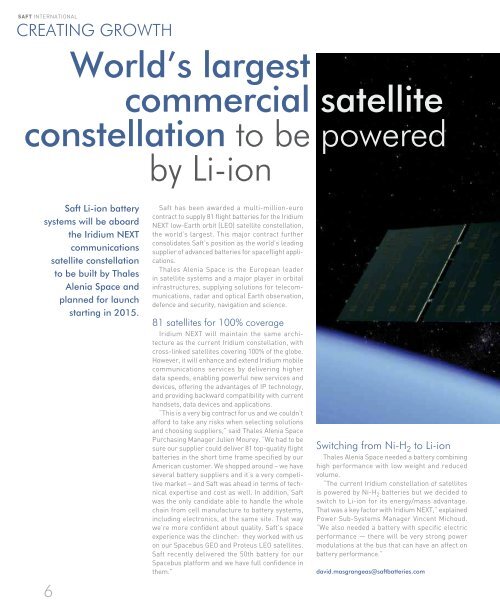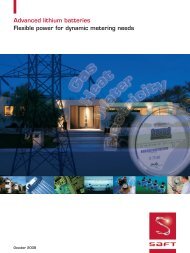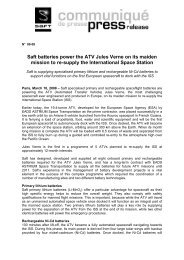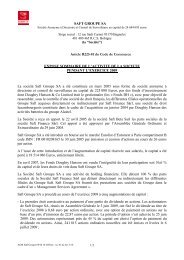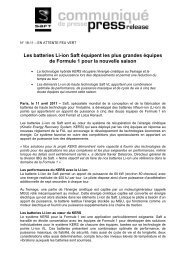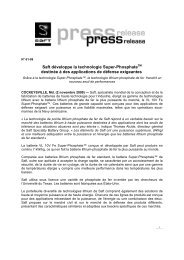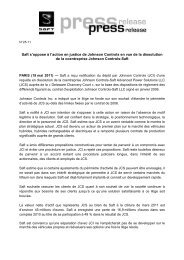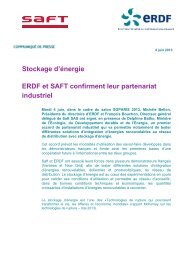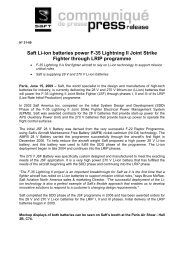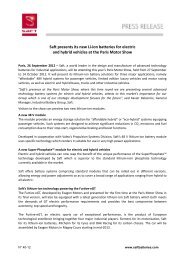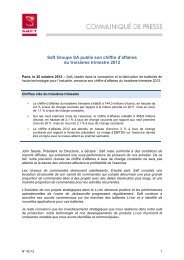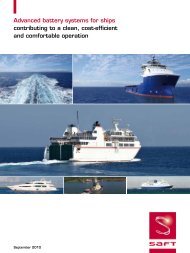Linde Material Handling - Saft
Linde Material Handling - Saft
Linde Material Handling - Saft
Create successful ePaper yourself
Turn your PDF publications into a flip-book with our unique Google optimized e-Paper software.
SAFT inTernATiOnAL<br />
CreatIng growth<br />
World’s largest<br />
commercial satellite<br />
constellation to be powered<br />
by Li-ion<br />
saft Li-ion battery<br />
systems will be aboard<br />
the iridium NEXt<br />
communications<br />
satellite constellation<br />
to be built by thales<br />
Alenia space and<br />
planned for launch<br />
starting in 2015.<br />
<strong>Saft</strong> has been awarded a multi-million-euro<br />
contract to supply 81 flight batteries for the iridium<br />
neXT low-earth orbit (LeO) satellite constellation,<br />
the world’s largest. This major contract further<br />
consolidates <strong>Saft</strong>’s position as the world’s leading<br />
supplier of advanced batteries for spaceflight applications.<br />
Thales Alenia Space is the european leader<br />
in satellite systems and a major player in orbital<br />
infrastructures, supplying solutions for telecommunications,<br />
radar and optical earth observation,<br />
defence and security, navigation and science.<br />
81 satellites for 100% coverage<br />
iridium neXT will maintain the same architecture<br />
as the current iridium constellation, with<br />
cross-linked satellites covering 100% of the globe.<br />
However, it will enhance and extend iridium mobile<br />
communications services by delivering higher<br />
data speeds, enabling powerful new services and<br />
devices, offering the advantages of ip technology,<br />
and providing backward compatibility with current<br />
handsets, data devices and applications.<br />
“This is a very big contract for us and we couldn’t<br />
afford to take any risks when selecting solutions<br />
and choosing suppliers,” said Thales Alenia Space<br />
purchasing manager Julien mourey. “We had to be<br />
sure our supplier could deliver 81 top-quality flight<br />
batteries in the short time frame specified by our<br />
American customer. We shopped around – we have<br />
several battery suppliers and it’s a very competitive<br />
market – and <strong>Saft</strong> was ahead in terms of technical<br />
expertise and cost as well. in addition, <strong>Saft</strong><br />
was the only candidate able to handle the whole<br />
chain from cell manufacture to battery systems,<br />
including electronics, at the same site. That way<br />
we’re more confident about quality. <strong>Saft</strong>’s space<br />
experience was the clincher: they worked with us<br />
on our Spacebus geO and proteus LeO satellites.<br />
<strong>Saft</strong> recently delivered the 50th battery for our<br />
Spacebus platform and we have full confidence in<br />
them.”<br />
switching from ni-h 2 to Li-ion<br />
Thales Alenia Space needed a battery combining<br />
high performance with low weight and reduced<br />
volume.<br />
“The current iridium constellation of satellites<br />
is powered by ni-H 2 batteries but we decided to<br />
switch to Li-ion for its energy/mass advantage.<br />
That was a key factor with iridium neXT,” explained<br />
power Sub-Systems manager Vincent michoud.<br />
“We also needed a battery with specific electric<br />
performance — there will be very strong power<br />
modulations at the bus that can have an affect on<br />
battery performance.”<br />
david.masgrangeas@saftbatteries.com<br />
sPaCe quaLIfIed battery systeMs<br />
the Iridium neXt battery system will comprise four modules based on saft’s<br />
MPs space-qualified prismatic format Li-ion cells developed to offer the ideal<br />
combination of robust construction, lightweight design, high performance<br />
and long service life for Leo satellite applications.<br />
6 7<br />
SAFT inTernATiOnAL


